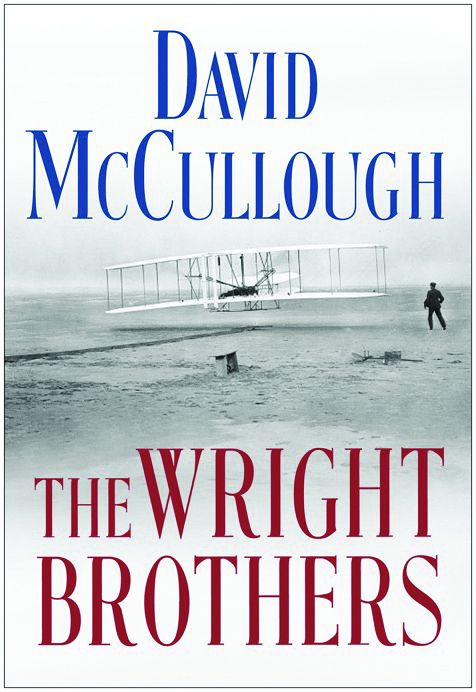 MS: What led you to this topic?
MS: What led you to this topic?
DM: It started out as a continuation of my last book, The Greater Journey, which was about Americans who went to France in the nineteenth century to improve their skills and careers. Through my research I discovered, to my surprise, the Wright brothers were among Americans who had gone there in the twentieth century. At that point I knew little about them beyond the fact that they were bicycle mechanics who invented the airplane.
It’s an extension of two of my previous books on high accomplishment of this sort, The Great Bridge [about the Brooklyn Bridge] and The Path Between the Seas [about the building of the Panama Canal], which occurred in roughly the same period.
There are other books about them, but I was much more interested in the human side of the story and others in the family, mainly their father and sister. They were clever, but much more than that. They’re similar to Harry Truman in that they didn’t go to college – in fact never finished high school – were very Midwestern in their values and principles, and never gave up once they got on to something. They exemplify admirable determination and perseverance, something I think we all need to be reminded of. It’s a profoundly American story that everyone ought to know, and I loved writing it!
MS: As you were researching did you discover any surprises?
DM: The role their father and sister play in the story. Their mother died when they were quite young and they grew up in a house with no electricity, no indoor plumbing, no telephone, but filled with books. Their father was an itinerant preacher who insisted they read widely and learn how to use the English language both on paper and on their feet. And the influence of their sister Katharine, without whom I’m not sure things would have gone as they did. She was a powerhouse, a strong, forceful personality who was always there when they needed her.
MS: I know of Charles Lindbergh’s connection to the Vineyard through his wife, and that they spent some time on the north shore. Did you discover any connection between the Vineyard and the Wright brothers?
DM: No, but I did discover a connection between them and my hometown of Pittsburgh. It turns out the Wright brothers built the first aluminum gasoline engine and they got the aluminum from a company in Pittsburgh.
And there is a Vineyard role in the book in that a good portion of it was written in my “world headquarters” right behind our house.
MS: You are giving a talk here in July to benefit the West Tisbury library. Do you have any comments on the role of libraries in communities?
DM: The Wright brothers depended tremendously on the Dayton public library, as did their father. Among other topics, they used it to research ship propellers to help them figure out plane propellers. They discovered that there was no technical, structural, or physical analysis of how they worked, and decided they’d have to figure that out themselves, which they did.
This book is very dependent on their letters, private correspondence which has survived at the Library of Congress. It’s incredible; it’s personal – full of inside family life – and superbly written. There are over one thousand private letters not counting the diaries, which are equally important. We Americans should never take our public libraries for granted. No other country has such a library system, and it’s all free – free to everyone.
MS: Is there any question I should have asked and didn’t?
DM: Yes. “Who played the biggest role in my writing this book?” The answer is my wife, Rosalee. She has been my editor in chief all the way along. I try to write for the ear as well as the eye and I think it improves the writing to have someone read what you’ve written aloud to you. She read every word and every chapter of the book, sometimes two or three times because I rewrite so much. She’s the editor in chief.
And one other thing. The Wright brothers studied soaring birds, how these miraculous birds could stay up for what seemed to be endless amounts of time without flapping their wings by riding the wind. How did they do that? In reading their notes and observations and in reading the books they read on soaring birds, I was so taken that I will never go on the beach on the Vineyard again and look at the soaring birds we have in plenitude there with the same eye, the same feeling ever again.
The book has three parts and each one begins with a line drawing of a different variety of soaring bird.




